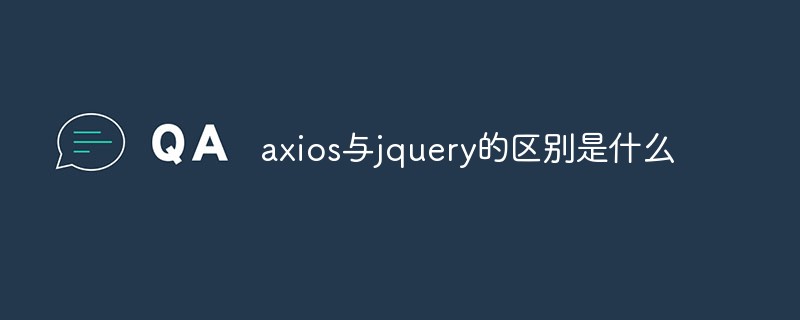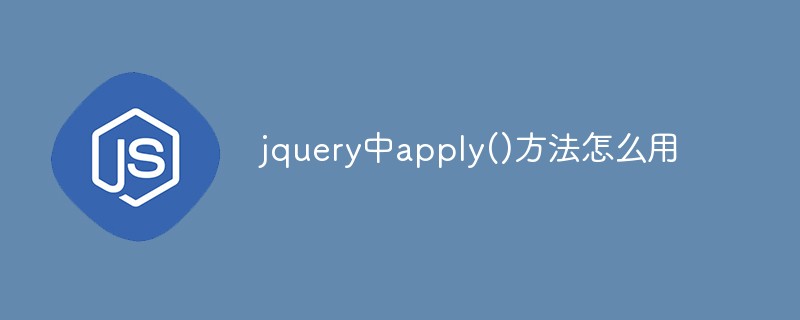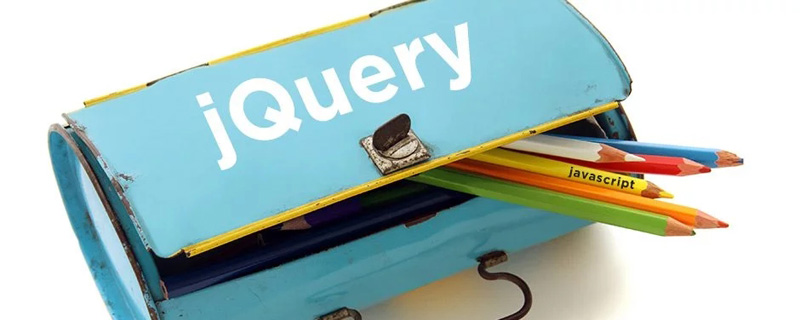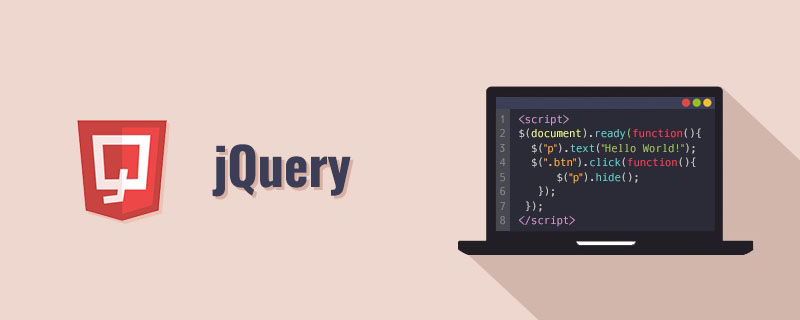Filtering method: 1. Use ".hasClass("class name")" to filter class names; 2. Use ".eq(n)" to filter subscripts; 3. Use ".is(select (selector)" filter judgment; 4. Use ".not (selector or function)" to reverse filter; 5. Use ".filter (selector or function)" to filter expressions.

The operating environment of this tutorial: windows10 system, jquery3.2.1 version, Dell G3 computer.
What to use for jquery filtering
In jQuery, there are 5 common filtering methods:
1. Class name filtering: hasClass( );
Class name filtering refers to filtering based on the class of the element. In jQuery, we can use the hasClass() method to implement class name filtering.
Syntax:
$().hasClass("类名")hasClass() method is generally used to determine whether the element contains the specified class name: if it does, it returns true; if it does not, it returns false.
2. Subscript filtering: eq();
Subscript filtering refers to filtering based on the subscript of the element collection. In jQuery, we can use the eq() method to implement subscript filtering.
Syntax:
$().eq(n)
n is an integer. When n takes the value 0 or a positive integer, eq(0) obtains the 1st element, eq(1) obtains the 2nd element,..., and so on. When n is a negative integer, eq(-1) obtains the first element from the last, eq(-2) obtains the second element from the last,..., and so on.
3. Judgment filtering: is();
Judgment filtering refers to judging based on certain conditions, and then selecting those that meet the conditions Elements. In jQuery, we can use the is() method to implement judgment filtering.
Syntax:
$().is(selector)
Parameter selector is a selector. The is() method is used to determine whether there is an element that meets the conditions in the currently selected element collection: if it exists, it returns true; if it does not exist, it returns false.
The is() method is very easy to use, and whether it can be used well directly determines whether your code is efficient. When developing with jQuery, there is nothing you can't do, only things you can't imagine. Listed below are the common function codes of the is() method:
//判断元素是否可见
$().is(":visible")
//判断元素是否处于动画中
$().is(":animated")
//判断单选框或复选框是否被选中
$().is(":checked")
//判断当前元素是否为第一个子元素
$(this).is(":first-child")
//判断文本中是否包含jQuery这个词
$().is(":contains('jQuery')")
//判断是否包含某些类名
$().is(".select")4. Reverse filtering: not();
in In jQuery, we can also use the not() method to filter elements that "do not meet the conditions" and return the remaining elements that meet the conditions. Among them, the not() method can use a selector to filter or a function to filter.
Syntax:
$().not(selector或fn)
When the not() method parameter is a selector, it means using the selector to filter elements that do not meet the conditions, and then select the remaining elements. When the parameter of the not() method is a function, it means using the function to filter elements that do not meet the conditions, and then select the remaining elements.
5. Expression filtering: filter(), has().
Expression filtering refers to using "custom expression" to select elements that meet the conditions. This custom expression can be a selector or a function.
In jQuery, there are two methods for expression filtering: one is the filter() method and the other is the has() method.
jQuery filter() method
In jQuery, the filter() method is a very powerful filtering method. It can use selectors to filter, or you can use function to filter.
1) Selector filtering
Selector filtering refers to using a selector to select elements that meet conditions.
Syntax:
$().filter(selector)
Parameter selector is a selector.
2) Function filtering
Function filtering refers to selecting elements that meet the conditions based on the return value of the function.
Syntax:
$().filter(fn)
The parameter fn is a callback function.
The filter() method is very powerful and includes almost all the functions of the filtering methods learned before. However, it is precisely because there are too many things encapsulated inside the filter() method that it runs very slowly. Therefore, in actual development, it is recommended that you give priority to other filtering methods and use the filter() method as a last resort.
jQuery has() method
In jQuery, in addition to using the filter() method for expression filtering, we can also use the has() method. Although the has() method is not as powerful as the filter() method, it runs faster.
Syntax:
$().has(selector)
Parameter selector is a selector.
The has() method has similar functions to the filter() method, but the has() method can only use selectors to filter, not functions. Therefore we can think of the has() method as a streamlined version of the filter() method.
Recommended related video tutorials: jQuery video tutorial
The above is the detailed content of What does jquery use for filtering?. For more information, please follow other related articles on the PHP Chinese website!
 jquery实现多少秒后隐藏图片Apr 20, 2022 pm 05:33 PM
jquery实现多少秒后隐藏图片Apr 20, 2022 pm 05:33 PM实现方法:1、用“$("img").delay(毫秒数).fadeOut()”语句,delay()设置延迟秒数;2、用“setTimeout(function(){ $("img").hide(); },毫秒值);”语句,通过定时器来延迟。
 jquery怎么修改min-height样式Apr 20, 2022 pm 12:19 PM
jquery怎么修改min-height样式Apr 20, 2022 pm 12:19 PM修改方法:1、用css()设置新样式,语法“$(元素).css("min-height","新值")”;2、用attr(),通过设置style属性来添加新样式,语法“$(元素).attr("style","min-height:新值")”。
 axios与jquery的区别是什么Apr 20, 2022 pm 06:18 PM
axios与jquery的区别是什么Apr 20, 2022 pm 06:18 PM区别:1、axios是一个异步请求框架,用于封装底层的XMLHttpRequest,而jquery是一个JavaScript库,只是顺便封装了dom操作;2、axios是基于承诺对象的,可以用承诺对象中的方法,而jquery不基于承诺对象。
 jquery怎么在body中增加元素Apr 22, 2022 am 11:13 AM
jquery怎么在body中增加元素Apr 22, 2022 am 11:13 AM增加元素的方法:1、用append(),语法“$("body").append(新元素)”,可向body内部的末尾处增加元素;2、用prepend(),语法“$("body").prepend(新元素)”,可向body内部的开始处增加元素。
 jquery中apply()方法怎么用Apr 24, 2022 pm 05:35 PM
jquery中apply()方法怎么用Apr 24, 2022 pm 05:35 PM在jquery中,apply()方法用于改变this指向,使用另一个对象替换当前对象,是应用某一对象的一个方法,语法为“apply(thisobj,[argarray])”;参数argarray表示的是以数组的形式进行传递。
 jquery怎么删除div内所有子元素Apr 21, 2022 pm 07:08 PM
jquery怎么删除div内所有子元素Apr 21, 2022 pm 07:08 PM删除方法:1、用empty(),语法“$("div").empty();”,可删除所有子节点和内容;2、用children()和remove(),语法“$("div").children().remove();”,只删除子元素,不删除内容。
 jquery怎么去掉只读属性Apr 20, 2022 pm 07:55 PM
jquery怎么去掉只读属性Apr 20, 2022 pm 07:55 PM去掉方法:1、用“$(selector).removeAttr("readonly")”语句删除readonly属性;2、用“$(selector).attr("readonly",false)”将readonly属性的值设置为false。
 jquery on()有几个参数Apr 21, 2022 am 11:29 AM
jquery on()有几个参数Apr 21, 2022 am 11:29 AMon()方法有4个参数:1、第一个参数不可省略,规定要从被选元素添加的一个或多个事件或命名空间;2、第二个参数可省略,规定元素的事件处理程序;3、第三个参数可省略,规定传递到函数的额外数据;4、第四个参数可省略,规定当事件发生时运行的函数。


Hot AI Tools

Undresser.AI Undress
AI-powered app for creating realistic nude photos

AI Clothes Remover
Online AI tool for removing clothes from photos.

Undress AI Tool
Undress images for free

Clothoff.io
AI clothes remover

AI Hentai Generator
Generate AI Hentai for free.

Hot Article

Hot Tools

ZendStudio 13.5.1 Mac
Powerful PHP integrated development environment

SAP NetWeaver Server Adapter for Eclipse
Integrate Eclipse with SAP NetWeaver application server.

EditPlus Chinese cracked version
Small size, syntax highlighting, does not support code prompt function

DVWA
Damn Vulnerable Web App (DVWA) is a PHP/MySQL web application that is very vulnerable. Its main goals are to be an aid for security professionals to test their skills and tools in a legal environment, to help web developers better understand the process of securing web applications, and to help teachers/students teach/learn in a classroom environment Web application security. The goal of DVWA is to practice some of the most common web vulnerabilities through a simple and straightforward interface, with varying degrees of difficulty. Please note that this software

Atom editor mac version download
The most popular open source editor







